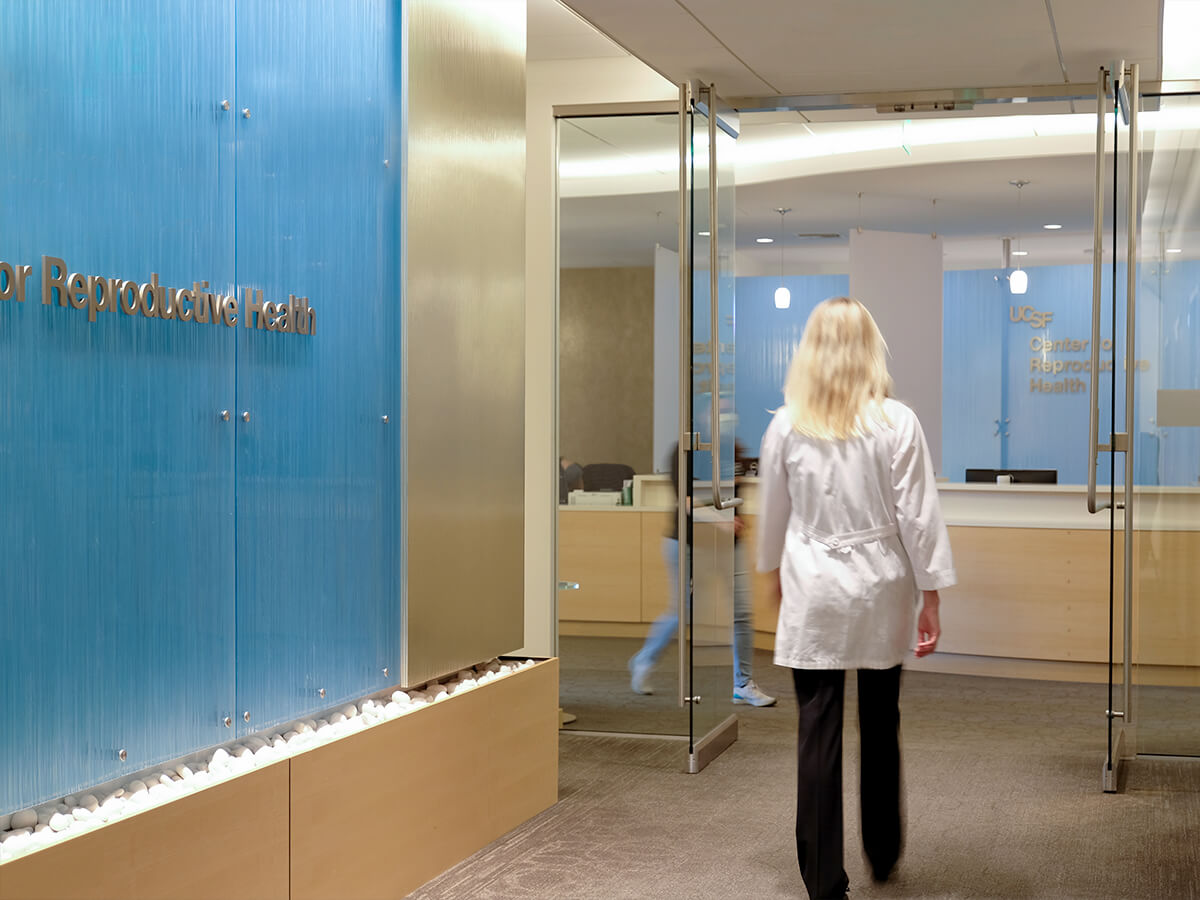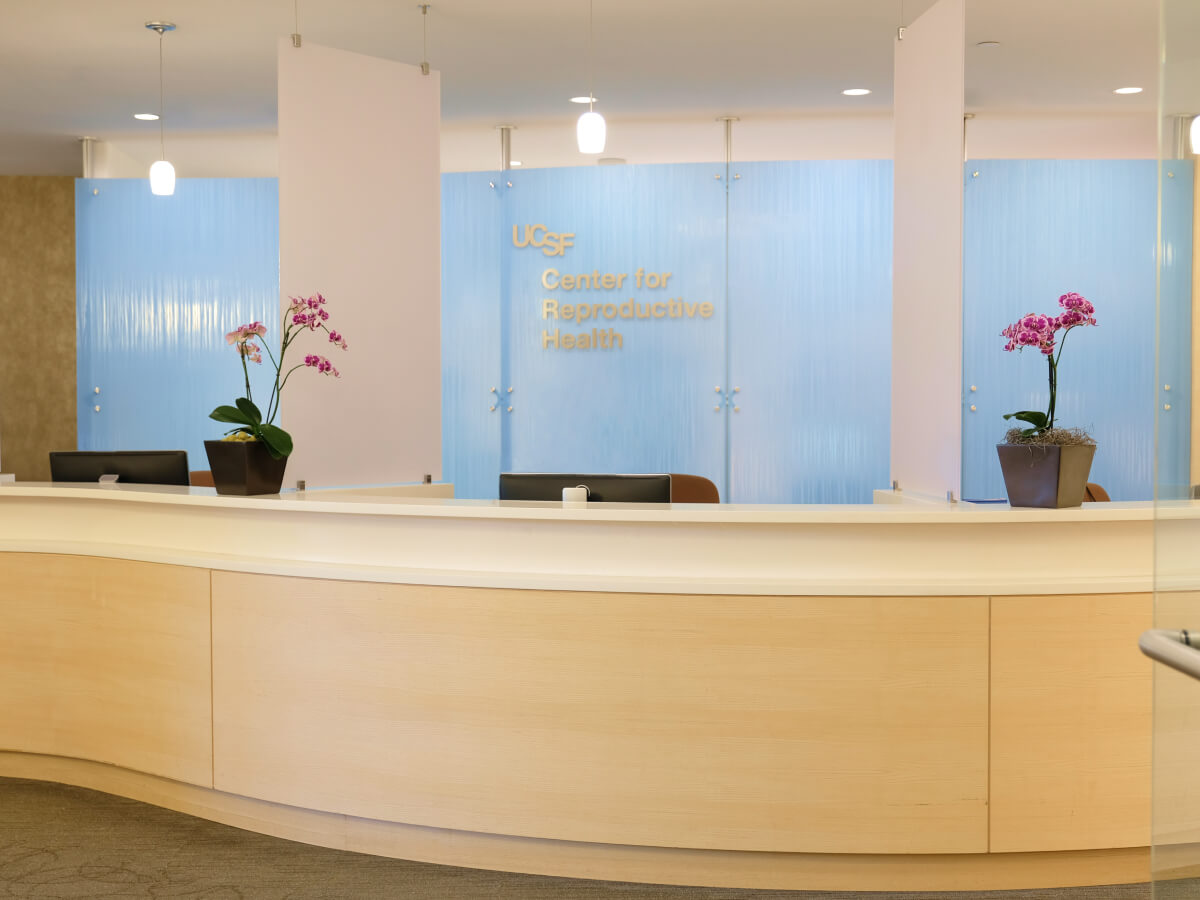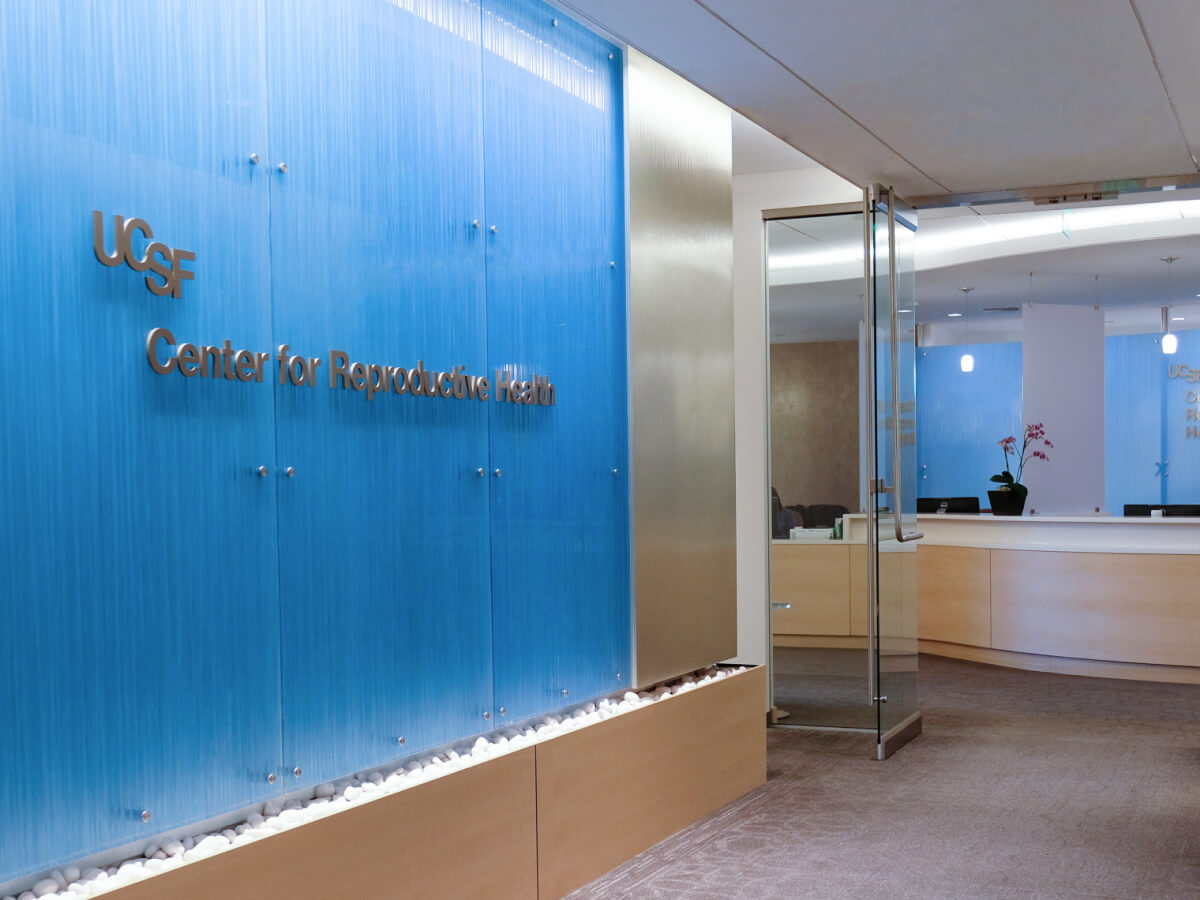Visit us in San Francisco
Academic standards. Pioneering research. Personalized care. Start your journey at the UCSF Center for Reproductive Health, located in Northern California's San Francisco Bay Area.
We are currently booking new patient appointments. Please fill out our form to get started.
Donating your eggs is a very generous way to help patients who yearn to become parents. Below is a summary of what is involved in the process and an overview of our egg donor program.
Couples generally choose to use eggs from a donor because they are unable to conceive a child with the female partner’s own eggs. There are many reasons that a female may not be able to conceive with her own eggs, including older age, early menopause, previous cancer treatments which damaged the ovaries, or production of poor quality eggs. Frequently, the couples proceeding with an ovum donation cycle have already been through extensive fertility treatments without success. Egg recipients are usually couples but are sometimes single women or men.
"Having the opportunity to help others in their journey to becoming parents has been such a joy, and I feel honored to play a small part in that. UCSF CRH is an amazing program.”
UCSF CRH Egg Donor

Ovum donors offer an amazing gift to couples struggling to become parents. The knowledge that she has had the ability to make a profound difference for a family is frequently one of the most compelling reasons young women participate so generously in this process.
Being a donor means committing to a thorough health and psychological screening, and eventually helping a couple by undergoing the preliminary phases of in vitro fertilization. The medical procedures involved in being an egg donor include administering injectable medications to stimulate your ovaries, undergoing ultrasound monitoring over the course of 10-14 days and undergoing an outpatient procedure to remove the stimulated eggs from your ovaries.
You will be asked to complete a detailed questionnaire about your background, medical, family, and personal history. After that is complete and has been reviewed by our staff, we will call you to arrange screening appointments with our psychologist and genetic counselor. The last step is an appointment for a physical examination with a physician and laboratory tests.
The screening process generally takes a few weeks to complete. You will speak to the coordinator by phone and come into the office for a few short visits. Once you are chosen as an egg donor, a cycle takes approximately 4 weeks. During a two week period, you will come to the clinic approximately 7-10 times for ultrasound monitoring and blood tests. These appointments generally require a 15-30 minute visit in the morning. The day that you are scheduled for the egg retrieval, you will be at our clinic for a large portion of the day. Most donors are able to continue to work or go to school during the process.
As with any medical procedure, there are possible side effects and risks. Many women feel very minor or no discomfort during the donation cycle. Others have varying symptoms that typically resolve following the egg retrieval procedure. In some cases a donor might feel bloating, pressure, abdominal pain and swelling, breast tenderness and moodiness from the hormone medications, which will go away by her next period. Severe side effects are rare and will be discussed with you by a physician in detail prior to your entry in the program.
December 6, 2004,
Injection related:
The blood tests and hormone injections are usually well tolerated. However, some women
experience pain, redness, or minor bruising at the injection site. Allergic reactions are rare.
Medication related:
Hyperstimulation syndrome: There is a small risk of ovarian hyperstimulation syndrome (OHSS) developing during an egg donation cycle. OHSS generally occurs following the actually egg retrieval. It involves enlargement of the ovaries, significant increases in fluid retention within the abdomen and concentration of the blood within the blood vessels. It its more mild form, it can be uncomfortable but resolves within several days. The severe form occurs in approximately 1% of donor cycles. In severe cases, hospitalization may be required for monitoring. While the condition is serious, it usually lasts no more than one week.
Procedure related:
The egg retrieval is a transvaginal ultrasound guided procedure. The risk of serious complications of this procedure is rare: approximately 1 in 1,000. Serious complications involve bleeding, requiring observation in the hospital and/or blood transfusion, damage to internal organs and infection.
Other:
To date, available evidence does not suggest any increased risk of cancer of the breast or ovaries from serving as an egg donor. In addition there is no evidence of increased risk of infertility.
There is a chance of pregnancy occurring during the egg donation process, so it is critical to use barrier methods of contraception (e.g. condoms) or abstinence during this time period.
Your ovaries will become enlarged during the egg donation process. We request that you refrain from activities that involve high impact, such as running, mountain biking, jumping, etc until several weeks after the egg retrieval. After approximately one month, your ovaries will return to their normal size.
Yes! It is very important that you avoid intercourse from the time you start the hormone medication until 3 weeks after your egg retrieval. This will prevent an unwanted pregnancy and make sure the cycle proceeds as planned.
Yes, you can still work and go to school. However, the ovum donation process requires you to adhere strictly to your medication and appointment schedule. You must take the medication as instructed, and on time. You must be on time for all monitoring appointments and arrange for transportation to and from the egg retrieval. This requires that you make your ovum donor cycle a top priority during the few weeks that it occurs, and you may have to reschedule other events, classes or work times when necessary.
Yes. The shots are done at home. You can do them yourself, or have a close friend or family member help you with them. We will teach you how to mix and administer your medication in our office.
No. The procedure itself does not have any impact on your future ability to have children. Females are born with approximately two million eggs. Each month in a woman’s life a group of eggs begin the maturation process, but the body selects only one egg each cycle to ovulate while the rest are absorbed by her own body. Fertility medications “rescue” a portion of these excess eggs that the body would have ordinarily discarded.
When you agree to donate your eggs, you are giving up all rights and responsibilities associated with eggs and any child born as a result of them.
Most egg donor arrangements are anonymous, meaning you won’t know the recipients and they won’t know you. Information about you is shared with the recipients in a non-identifying manner. For example, you will be identified to patient couples by the following information: blood type, ethnic background of your mother and father, height, weight, body build, eye color, hair color and texture, years of education, occupation, and special interests and family medical history. Pictures you share with us will also be shared with potential recipients. We will not share the following information with the recipients: your last name, your address, your telephone number, your email address.
We are committed to creating egg donation arrangements that fit the personal needs of both donor and recipients. Some donors and recipients are interested in meeting each other and we support that process. On your application, you will indicate whether you are willing to meet the recipients, and whether you would be willing to meet their child when the child is an adult.
You must be truthful in all portions of the donor screening process, and follow the doctors’ orders during the treatment cycle. The ovum donation process requires you to adhere strictly to your medication and appointment schedule. You must take the medication as instructed, and on time. You must be on time for all monitoring appointments and arrange for transportation to and from the egg retrieval. This requires that you make your ovum donor cycle a top priority during the few weeks that it occurs. You will need to abstain from sex from the time you start the hormone medication until 3 weeks after your egg retrieval to prevent an unwanted pregnancy and make sure the cycle proceeds as planned.
Yes. If all goes well with your first ovum donation cycle, we would be happy to have you come back and donate again. Repeat donation may take less of your time, because you will have already completed the initial screening process. For your safety, ovum donors can donate no more than 6 times. This guideline has been published by the American Society for Reproductive Medicine.
With our egg donor program, you will receive top quality care within a highly respected university setting. Medical professionals will be involved at every level of your care. You will only have to go to one place for all your care, as opposed to signing up with an agency that might send you to donate at various locations.
Academic standards. Pioneering research. Personalized care. Start your journey at the UCSF Center for Reproductive Health, located in Northern California's San Francisco Bay Area.
Academic standards. Pioneering research. Personalized care. Start your journey at the UCSF Center for Reproductive Health, located in Northern California's San Francisco Bay Area.






